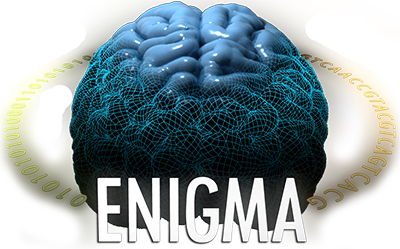Team Members | Ongoing Studies | Publications | Resources | Global Knowledge Exchange Network | IPV BI Virtual Conference
Carrie Esopenko, PhD. Lead Investigator for the ENIGMA IPV Working Group.
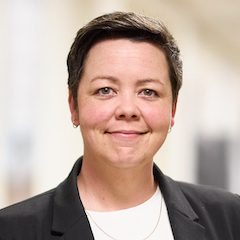 Dr. Carrie Esopenko is an Associate Professor in the Brain Injury Research Center at the Icahn School of Medicine at Mount Sinai Hospital in New York City. She is the principal investigator of a National Institute of Neurological Disorders and Stroke (NINDS) R01-funded study examining the psychological, cognitive, and neural signatures of IPV-related head trauma. She is also the Lead Investigator of the ENIGMA Intimate Partner Violence (IPV) Working Group, a global collaboration seeking to examine the effects of IPV-related brain injury, as well as a member of the ENIGMA Sports-Related Brain Injury, Military, and TBI Working Groups. She is also the Co-Principal Investigator for Rutgers University’s involvement in the Ivy League/Big Ten Epidemiology of Concussion Study as well as the Big Ten COVID-19 Cardiac Registry. Her research focuses on developing sex-specific prevention and assessment strategies for sports-related neurotrauma and examining the psychological, cognitive, and neuronal signatures of IPV-related head trauma. Click here for Dr. Esopenko’s website.
Dr. Carrie Esopenko is an Associate Professor in the Brain Injury Research Center at the Icahn School of Medicine at Mount Sinai Hospital in New York City. She is the principal investigator of a National Institute of Neurological Disorders and Stroke (NINDS) R01-funded study examining the psychological, cognitive, and neural signatures of IPV-related head trauma. She is also the Lead Investigator of the ENIGMA Intimate Partner Violence (IPV) Working Group, a global collaboration seeking to examine the effects of IPV-related brain injury, as well as a member of the ENIGMA Sports-Related Brain Injury, Military, and TBI Working Groups. She is also the Co-Principal Investigator for Rutgers University’s involvement in the Ivy League/Big Ten Epidemiology of Concussion Study as well as the Big Ten COVID-19 Cardiac Registry. Her research focuses on developing sex-specific prevention and assessment strategies for sports-related neurotrauma and examining the psychological, cognitive, and neuronal signatures of IPV-related head trauma. Click here for Dr. Esopenko’s website.
Elisabeth Wilde, PhD. Co-Lead Investigator for the ENIGMA Brain Injury Working Group.
 Dr. Elisabeth Wilde is an Associate Professor in the Department of Neurology at the University of Utah. She also holds an appointment as a Health Research Scientist at the VA Salt Lake City Healthcare System. Her research interests include the use of advanced forms of neuroimaging to enhance diagnosis and prognosis, monitor recovery and neurodegeneration, evaluate the efficacy of therapeutic intervention, and elucidate aspects of neuroplasticity in traumatic brain injury. As a clinical neuropsychologist, she has an interest in brain-behavior relationships involving cognitive, neurological, and functional outcome and clinical trials in traumatic brain injury and associated comorbidities. For the last 20 years, she has worked with patients with traumatic brain injury and concussion across a spectrum of age, severity, and acuity, with particular interests in children and adolescents, athletes, and Veteran and Active Duty Service Members with concussion or traumatic brain injury. She has participated in over 40 federally-funded clinical projects in TBI, and has authored over 140 peer-reviewed publications. Dr. Wilde is currently the Director of the Neuroimaging Core for the Department of Defense and Veterans Affairs co-funded Long-term Impact of Military-relevant Brain Injury Consortium (LIMBIC)/Chronic Effects of Neurotrauma Consortium (CENC) Neuroimaging Core and has been actively involved in the International Common Data Elements (CDE) initiative and co-leads the Enhancing Neuroimaging Genetics Meta-analysis (ENIGMA) Working Group for TBI. Click here for Dr. Wilde’s website.
Dr. Elisabeth Wilde is an Associate Professor in the Department of Neurology at the University of Utah. She also holds an appointment as a Health Research Scientist at the VA Salt Lake City Healthcare System. Her research interests include the use of advanced forms of neuroimaging to enhance diagnosis and prognosis, monitor recovery and neurodegeneration, evaluate the efficacy of therapeutic intervention, and elucidate aspects of neuroplasticity in traumatic brain injury. As a clinical neuropsychologist, she has an interest in brain-behavior relationships involving cognitive, neurological, and functional outcome and clinical trials in traumatic brain injury and associated comorbidities. For the last 20 years, she has worked with patients with traumatic brain injury and concussion across a spectrum of age, severity, and acuity, with particular interests in children and adolescents, athletes, and Veteran and Active Duty Service Members with concussion or traumatic brain injury. She has participated in over 40 federally-funded clinical projects in TBI, and has authored over 140 peer-reviewed publications. Dr. Wilde is currently the Director of the Neuroimaging Core for the Department of Defense and Veterans Affairs co-funded Long-term Impact of Military-relevant Brain Injury Consortium (LIMBIC)/Chronic Effects of Neurotrauma Consortium (CENC) Neuroimaging Core and has been actively involved in the International Common Data Elements (CDE) initiative and co-leads the Enhancing Neuroimaging Genetics Meta-analysis (ENIGMA) Working Group for TBI. Click here for Dr. Wilde’s website.
David Tate, PhD. Co-Lead Investigator for the ENIGMA Brain Injury Working Group.
 Dr. David Tate is a clinical neuropsychologist trained at Brigham Young University and Brown Medical School. He is heavily involved in medical imaging research used to examine a number of developmental, clinical, and medical disorders, especially traumatic brain injury. Dr. Tate has held faculty appointments at Brown University, Harvard Medical School, and University of Missouri-St. Louis. Dr. Tate has an active funded research program that explores the biological and cognitive benefits of cognitive rehabilitation treatments for service members with a traumatic brain injury. He also supports the Neuroimaging Core for the Chronic Effects of Neurotrauma Consortium (CENC) which is a multicenter DoD/VA funded collaborative effort to study the long-term effects of mild traumatic brain injury among US service members and veterans. In addition, he has begun working with researchers examining the imaging and cognitive effects high altitude flying has on pilots working in decompressed environments. Click here for Dr. Tate’s website.
Dr. David Tate is a clinical neuropsychologist trained at Brigham Young University and Brown Medical School. He is heavily involved in medical imaging research used to examine a number of developmental, clinical, and medical disorders, especially traumatic brain injury. Dr. Tate has held faculty appointments at Brown University, Harvard Medical School, and University of Missouri-St. Louis. Dr. Tate has an active funded research program that explores the biological and cognitive benefits of cognitive rehabilitation treatments for service members with a traumatic brain injury. He also supports the Neuroimaging Core for the Chronic Effects of Neurotrauma Consortium (CENC) which is a multicenter DoD/VA funded collaborative effort to study the long-term effects of mild traumatic brain injury among US service members and veterans. In addition, he has begun working with researchers examining the imaging and cognitive effects high altitude flying has on pilots working in decompressed environments. Click here for Dr. Tate’s website.
Emily Dennis, PhD. Co-Lead Investigator for the ENIGMA Brain Injury Working Group.
 Dr. Dennis is an Assistant Professor of Neurology at the University of Utah. She completed her Neuroscience PhD at the University of California, Los Angeles in 2013 focusing on structural connectivity across development with Dr. Paul Thompson. She completed postdocs at the University of Southern California and Brigham & Women’s Hospital. Her work focuses on the effects of traumatic brain injury on brain structure and function and aims to better understand sources of variability in post-injury outcome. Along with Drs. Tate and Wilde, Dr. Dennis is a co-PI of the Brain Injury working group of the ENIGMA consortium (Enhancing NeuroImaging Genetics through Meta-Analysis). The ENIGMA Brain Injury working group currently has over 170 researchers from 13 countries involved across 10 different subgroups. The subgroups are either focused on specific patient populations (military, sports, pediatric, moderate/severe TBI, acute mild TBI, intimate partner violence) or methods development (resting state fMRI, magnetic resonance spectroscopy, clinical endpoints, arterial spin labeling). Click here for Dr. Dennis’ website.
Dr. Dennis is an Assistant Professor of Neurology at the University of Utah. She completed her Neuroscience PhD at the University of California, Los Angeles in 2013 focusing on structural connectivity across development with Dr. Paul Thompson. She completed postdocs at the University of Southern California and Brigham & Women’s Hospital. Her work focuses on the effects of traumatic brain injury on brain structure and function and aims to better understand sources of variability in post-injury outcome. Along with Drs. Tate and Wilde, Dr. Dennis is a co-PI of the Brain Injury working group of the ENIGMA consortium (Enhancing NeuroImaging Genetics through Meta-Analysis). The ENIGMA Brain Injury working group currently has over 170 researchers from 13 countries involved across 10 different subgroups. The subgroups are either focused on specific patient populations (military, sports, pediatric, moderate/severe TBI, acute mild TBI, intimate partner violence) or methods development (resting state fMRI, magnetic resonance spectroscopy, clinical endpoints, arterial spin labeling). Click here for Dr. Dennis’ website.
Maheen Adamson, PhD.
 Dr. Adamson completed her undergraduate degrees in neurobiology and women studies at University of California, Irvine. She completed her Ph.D. in neuroscience from the University of Southern California and a postdoctoral fellowship in psychiatry and behavioral sciences at Stanford School of Medicine. Dr. Adamson served as Director for Research and PhD Fellowships at War Related Illness and Injury Center (WRIISC) for seven years at the VA Palo Alto. During this time Dr. Adamson developed expertise in employing translational neuroscience methodologies for diagnostic and therapeutic treatments in mild and moderate TBI, including structural and functional changes in the brain associated with Alzheimer’s disease and TBI, especially in the Veteran population.
Dr. Adamson completed her undergraduate degrees in neurobiology and women studies at University of California, Irvine. She completed her Ph.D. in neuroscience from the University of Southern California and a postdoctoral fellowship in psychiatry and behavioral sciences at Stanford School of Medicine. Dr. Adamson served as Director for Research and PhD Fellowships at War Related Illness and Injury Center (WRIISC) for seven years at the VA Palo Alto. During this time Dr. Adamson developed expertise in employing translational neuroscience methodologies for diagnostic and therapeutic treatments in mild and moderate TBI, including structural and functional changes in the brain associated with Alzheimer’s disease and TBI, especially in the Veteran population.
Dr. Adamson's dynamic roles at Stanford School of Medicine, DOD and VA Palo Alto allow her to make strong collaborations with the VA and Stanford faculty and nourish her translational research interests, particularly in developing neuroscience-based methods that can be clinically implemented to provide precision care to women and underrepresented minorities. She uses innovative techniques to study mild and moderate brain injury related deficits through state-of-the art neuroimaging, genetic analysis, cognitive and neuropsychological testing. She is also the PI & Site PI for three clinical trials in neuromodulation for treatment of cognitive problems, depression and pain. Dr. Adamson has authored numerous peer-reviewed publications on cognitive and neural basis of Alzheimer’s disease and TBI, has received recognition in national and international settings and is a frequent presenter at national and international conferences. She currently serves as Director for Research, Rehabilitation Service at VA Palo Alto and is a Clinical Associate Professor of Neurosurgery at Stanford School of Medicine. She is also Director of Research Fellowship for Rehabilitation at VA Palo Alto. She serves on the Board of Directors for Brain Injury Association of California, Pink Concussion, California State Rehabilitation TBI Advisory Committee and is a senior/associate editor for Journal of Alzheimer's disease. Click here for Dr. Adamson’s website.
Esther Bennett, MSS, LSW.
 Esther Bennett is a licensed social worker and completed a Master of Social Work at Bryn Mawr College. She is currently completing her PhD in the School of Social Work at Rutgers University. Her research involves intervention and prevention science targeting the neurobiological ramifications of post-traumatic stress and traumatic brain injury. She is a graduate research assistant working at the Center on Violence Against Women and Children (2019-Present) with Dr. Sarah McMahon studying prevention and intervention strategies to address all forms of violence, abuse, and campus sexual assault. She was also the Clinical Research Coordinator at the University of Texas at Austin (2017-2019), working with Dr. David Schnyer studying cognitive neuroscience and traumatic brain injury.
Esther Bennett is a licensed social worker and completed a Master of Social Work at Bryn Mawr College. She is currently completing her PhD in the School of Social Work at Rutgers University. Her research involves intervention and prevention science targeting the neurobiological ramifications of post-traumatic stress and traumatic brain injury. She is a graduate research assistant working at the Center on Violence Against Women and Children (2019-Present) with Dr. Sarah McMahon studying prevention and intervention strategies to address all forms of violence, abuse, and campus sexual assault. She was also the Clinical Research Coordinator at the University of Texas at Austin (2017-2019), working with Dr. David Schnyer studying cognitive neuroscience and traumatic brain injury.
Kathy Chiou, PhD.
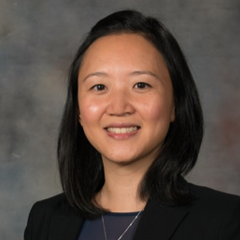 Kathy S. Chiou, Ph.D. is an Assistant Professor in the Department of Psychology at the University of Nebraska-Lincoln. Broadly, Dr. Chiou’s research examines the effect of traumatic brain injury (TBI) on processes of self-awareness and metacognition, as well as other higher order domains of neurocognitive function. She also has a particular interest in working with subsamples of civilian populations that are at high risk for sustaining or having un-diagnosed TBIs. To this end, Dr. Chiou partners with community organizations who serve survivors of intimate partner violence (IPV) to identify, screen, and assess individuals who have probable IPV-related brain injuries. She hopes that research in this area will help bring about systematic changes to service delivery that ultimately improve outcomes and quality of life for survivors with IPV-related brain injury. Click here for Dr. Chiou’s website.
Kathy S. Chiou, Ph.D. is an Assistant Professor in the Department of Psychology at the University of Nebraska-Lincoln. Broadly, Dr. Chiou’s research examines the effect of traumatic brain injury (TBI) on processes of self-awareness and metacognition, as well as other higher order domains of neurocognitive function. She also has a particular interest in working with subsamples of civilian populations that are at high risk for sustaining or having un-diagnosed TBIs. To this end, Dr. Chiou partners with community organizations who serve survivors of intimate partner violence (IPV) to identify, screen, and assess individuals who have probable IPV-related brain injuries. She hopes that research in this area will help bring about systematic changes to service delivery that ultimately improve outcomes and quality of life for survivors with IPV-related brain injury. Click here for Dr. Chiou’s website.
Kristen Dams-O’Connor, PhD.
 Kristen Dams-O’Connor, Ph.D. is the Director of the Brain Injury Research Center of Mount Sinai and Professor in the Departments of Rehabilitation Medicine and Neurology at Icahn School of Medicine at Mount Sinai in New York, NY. She completed her PhD at the University at Albany, doctoral training at the Rusk Institute of Rehabilitation Medicine at New York University Medical Center and then completed a postdoctoral fellowship in Clinical Neuropsychology at Mount Sinai Medical Center. Dr. Dams-O’Connor’s research is focused on identifying mechanisms, risk and protective factors for post-traumatic neurodegeneration in individuals with TBI and repetitive head trauma sustained through sports participation, military service, and intimate partner violence. Her team uses modern psychometric and statistical techniques to measure individual differences in trajectories of change over time among survivors of TBI. She leads the Late Effects of TBI (LETBI) Project, a TBI brain donor program focused on characterizing the clinical phenotype and postmortem pathological signatures of post-traumatic dementia and their associations with Alzheimer’s disease and related dementias. She is also Project Director of the New York Traumatic Brain Injury Model System of care, one of 16 centers of excellence for TBI research in the United States. Her research is currently supported by federal grants from the National Institutes of Health, National Institute for Disability Independent Living and Rehabilitation Research, Department of Defense, Centers for Disease Control, and Patient Reported Outcomes Research Institute. Her clinical expertise is in neuropsychological assessment and intervention for individuals with neurological diseases. Click here for Dr. Dams-O’Connor’s website.
Kristen Dams-O’Connor, Ph.D. is the Director of the Brain Injury Research Center of Mount Sinai and Professor in the Departments of Rehabilitation Medicine and Neurology at Icahn School of Medicine at Mount Sinai in New York, NY. She completed her PhD at the University at Albany, doctoral training at the Rusk Institute of Rehabilitation Medicine at New York University Medical Center and then completed a postdoctoral fellowship in Clinical Neuropsychology at Mount Sinai Medical Center. Dr. Dams-O’Connor’s research is focused on identifying mechanisms, risk and protective factors for post-traumatic neurodegeneration in individuals with TBI and repetitive head trauma sustained through sports participation, military service, and intimate partner violence. Her team uses modern psychometric and statistical techniques to measure individual differences in trajectories of change over time among survivors of TBI. She leads the Late Effects of TBI (LETBI) Project, a TBI brain donor program focused on characterizing the clinical phenotype and postmortem pathological signatures of post-traumatic dementia and their associations with Alzheimer’s disease and related dementias. She is also Project Director of the New York Traumatic Brain Injury Model System of care, one of 16 centers of excellence for TBI research in the United States. Her research is currently supported by federal grants from the National Institutes of Health, National Institute for Disability Independent Living and Rehabilitation Research, Department of Defense, Centers for Disease Control, and Patient Reported Outcomes Research Institute. Her clinical expertise is in neuropsychological assessment and intervention for individuals with neurological diseases. Click here for Dr. Dams-O’Connor’s website.
Nicola de Souza, MSc.
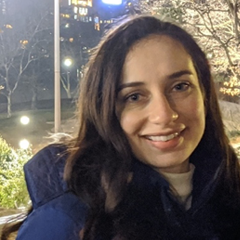 Nicola de Souza, MSc, is a PhD candidate in Dr. Carrie Esopenko’s laboratory at Rutgers Biomedical and Health Sciences. Ms. de Souza has a BSc in Psychology from Queen’s University (Kingston, Canada) and an MSc in Cognitive and Decision Sciences from University College London (London, UK). Her research uses neuroimaging techniques (DTI, fMRI) to probe the effects of traumatic brain injury on cognitive, psychological, and neural processes across the lifespan. She is particularly interested in how brain injury may affect decision making and self-control. She hopes that her research will contribute to our understanding of functional impairments post-injury, which may be used to inform cognitive rehabilitation strategies after traumatic brain injury.
Nicola de Souza, MSc, is a PhD candidate in Dr. Carrie Esopenko’s laboratory at Rutgers Biomedical and Health Sciences. Ms. de Souza has a BSc in Psychology from Queen’s University (Kingston, Canada) and an MSc in Cognitive and Decision Sciences from University College London (London, UK). Her research uses neuroimaging techniques (DTI, fMRI) to probe the effects of traumatic brain injury on cognitive, psychological, and neural processes across the lifespan. She is particularly interested in how brain injury may affect decision making and self-control. She hopes that her research will contribute to our understanding of functional impairments post-injury, which may be used to inform cognitive rehabilitation strategies after traumatic brain injury.
Brenda Eagan-Johnson, PhD.
 Brenda Eagan-Johnson, EdD, CBIST is a national authority regarding the educational aspects of all severities of pediatric Acquired Brain Injury (both traumatic and non-traumatic) with over two decades of experience. Dr. Eagan-Johnson is the State Program Coordinator for the nationally recognized Child and Adolescent Brain Injury School Consulting Program, BrainSTEPS, in Pennsylvania. She helped create this model in 2007. The Colorado Department of Education adopted the BrainSTEPS model in 2016. Dr. Eagan-Johnson focuses on program development, implementation, consultation, and training for the approximately 300 educational consultants on 30 brain injury educational consulting teams across the state. Dr. Eagan-Johnson serves on the Board of Governors for the Academy of Certified Brain Injury Specialists under the Brain Injury Association of America. Dr. Eagan-Johnson received her Master's Degree in Education and Human Development, focusing on transition & special education for students with pediatric TBI from the George Washington University, where she now serves as an adjunct instructor in the Graduate School of Education and Human Development. Dr. Eagan-Johnson is a Certified Brain Injury Specialist Trainer, holds three PA teaching certifications, and serves on several national advisory boards. Dr. Eagan-Johnson served as an expert external reviewer for the Centers for Disease Control (CDC) and has co-authored a CDC document on return to school strategies. She is currently an expert consultant for the CDC $2.2 million 4-year study of the BrainSTEPS model. Spearheading development and creation of PA’s Return to Learn Concussion Management Team Model, she has trained over 3,000+ school-based teams. Click here for Dr. Eagan-Johnson’s website.
Brenda Eagan-Johnson, EdD, CBIST is a national authority regarding the educational aspects of all severities of pediatric Acquired Brain Injury (both traumatic and non-traumatic) with over two decades of experience. Dr. Eagan-Johnson is the State Program Coordinator for the nationally recognized Child and Adolescent Brain Injury School Consulting Program, BrainSTEPS, in Pennsylvania. She helped create this model in 2007. The Colorado Department of Education adopted the BrainSTEPS model in 2016. Dr. Eagan-Johnson focuses on program development, implementation, consultation, and training for the approximately 300 educational consultants on 30 brain injury educational consulting teams across the state. Dr. Eagan-Johnson serves on the Board of Governors for the Academy of Certified Brain Injury Specialists under the Brain Injury Association of America. Dr. Eagan-Johnson received her Master's Degree in Education and Human Development, focusing on transition & special education for students with pediatric TBI from the George Washington University, where she now serves as an adjunct instructor in the Graduate School of Education and Human Development. Dr. Eagan-Johnson is a Certified Brain Injury Specialist Trainer, holds three PA teaching certifications, and serves on several national advisory boards. Dr. Eagan-Johnson served as an expert external reviewer for the Centers for Disease Control (CDC) and has co-authored a CDC document on return to school strategies. She is currently an expert consultant for the CDC $2.2 million 4-year study of the BrainSTEPS model. Spearheading development and creation of PA’s Return to Learn Concussion Management Team Model, she has trained over 3,000+ school-based teams. Click here for Dr. Eagan-Johnson’s website.
Mike Ellis, MD.
 Michael Ellis, MD, is Assistant Professor in the Department of Surgery, Section of Neurosurgery at the University of Manitoba and Medical Director of the Pan Am Concussion Program, a multi-disciplinary clinical program devoted to care of patients with concussion and traumatic brain injuries. His clinical interests include the care of patients with acute intimate partner violence brain injuries and the use of telemedicine to expand clinical care to medically underserved rural and remote communities.
Michael Ellis, MD, is Assistant Professor in the Department of Surgery, Section of Neurosurgery at the University of Manitoba and Medical Director of the Pan Am Concussion Program, a multi-disciplinary clinical program devoted to care of patients with concussion and traumatic brain injuries. His clinical interests include the care of patients with acute intimate partner violence brain injuries and the use of telemedicine to expand clinical care to medically underserved rural and remote communities.
Aeriel Halstead, MS.
 Aeriel is a doctoral candidate in Clinical Psychology at Brigham Young University (2017) studying in Dr. Scott Braithwaite's laboratory. She has earned bachelor's degrees in Psychology and Communication Studies and an M.S. in Psychology from BYU. Ms. Halstead's research focuses on the prevention of intimate partner violence (IPV), seeking to understand interventions that can be used prior to violence occurring. In addition, she researches lay conceptualizations of IPV to see how perceptions affect risk. She has worked as a therapist for victims of IPV conducting individual and group therapy and she has also served as a victim advocate for victims of rape and sexual assault. She hopes to apply her skills and research to understand IPV, assist those who have been impacted, and disseminate valuable information to the public.
Aeriel is a doctoral candidate in Clinical Psychology at Brigham Young University (2017) studying in Dr. Scott Braithwaite's laboratory. She has earned bachelor's degrees in Psychology and Communication Studies and an M.S. in Psychology from BYU. Ms. Halstead's research focuses on the prevention of intimate partner violence (IPV), seeking to understand interventions that can be used prior to violence occurring. In addition, she researches lay conceptualizations of IPV to see how perceptions affect risk. She has worked as a therapist for victims of IPV conducting individual and group therapy and she has also served as a victim advocate for victims of rape and sexual assault. She hopes to apply her skills and research to understand IPV, assist those who have been impacted, and disseminate valuable information to the public.
Frank Hillary, PhD.
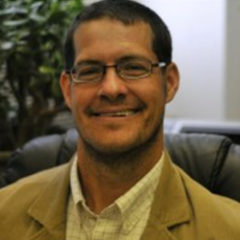 My research focuses on behavioral outcomes following moderate and severe TBI and their links to structural and functional MRI changes, with focus on systems-level plasticity after injury. Since the shift in the fMRI literature toward brain connectivity over a decade ago, my work has employed primarily connectivity methods, pioneering the first TBI studies using resting connectivity and graph theory. Our lab has now produced many of the studies in the TBI literature examining connectivity changes over time during early recovery windows (3-12 months post injury). Most recently we have shifted this lense to much later in life, with focus on the developmental trajectories of TBI outcomes years after injury with the goal of identifying novel markers predictive of cognitive resilience. The ultimate goal for this work is to develop insights into how neural systems ideally adapt to significant disruption not only in the short-term, but over the course of the life span. Ultimately, to understand the myriad consequences of TBI on neural systems, we need more accurate models that include the many determinants of clinical outcome in TBI including sex, time-post injury, age of injury, and SES. To do so, there is critical need for much larger data sets achieved through curation and harmonization of archival data existing in TBI labs around the world, which make the goals of ENIGMA working groups vitally important. Click here for Dr. Hillary’s website.
My research focuses on behavioral outcomes following moderate and severe TBI and their links to structural and functional MRI changes, with focus on systems-level plasticity after injury. Since the shift in the fMRI literature toward brain connectivity over a decade ago, my work has employed primarily connectivity methods, pioneering the first TBI studies using resting connectivity and graph theory. Our lab has now produced many of the studies in the TBI literature examining connectivity changes over time during early recovery windows (3-12 months post injury). Most recently we have shifted this lense to much later in life, with focus on the developmental trajectories of TBI outcomes years after injury with the goal of identifying novel markers predictive of cognitive resilience. The ultimate goal for this work is to develop insights into how neural systems ideally adapt to significant disruption not only in the short-term, but over the course of the life span. Ultimately, to understand the myriad consequences of TBI on neural systems, we need more accurate models that include the many determinants of clinical outcome in TBI including sex, time-post injury, age of injury, and SES. To do so, there is critical need for much larger data sets achieved through curation and harmonization of archival data existing in TBI labs around the world, which make the goals of ENIGMA working groups vitally important. Click here for Dr. Hillary’s website.
Cooper Hodges, PhD.
 Cooper Hodges, PhD earned a Bachelor of Science in psychology from Andrews University in 2016 and a doctorate in experimental psychology with emphasis in cognitive and behavioral neuroscience from Brigham Young University in 2020. He is currently a Postdoctoral Fellow at Virginia Commonwealth University in the Department of Physical Medicine and Rehabilitation. Cooper’s research interests primarily involve the use of emerging neuroimaging techniques in investigating traumatic brain injury in various patient populations and the downstream effects of injury on neural function and structure. Cooper’s interests extend into statistical and experimental methods, where he is interested in furthering recommendations for best practices in methodology and statistics in psychological science, and supporting ongoing efforts promoting replicability and transparency in scientific literature.
Cooper Hodges, PhD earned a Bachelor of Science in psychology from Andrews University in 2016 and a doctorate in experimental psychology with emphasis in cognitive and behavioral neuroscience from Brigham Young University in 2020. He is currently a Postdoctoral Fellow at Virginia Commonwealth University in the Department of Physical Medicine and Rehabilitation. Cooper’s research interests primarily involve the use of emerging neuroimaging techniques in investigating traumatic brain injury in various patient populations and the downstream effects of injury on neural function and structure. Cooper’s interests extend into statistical and experimental methods, where he is interested in furthering recommendations for best practices in methodology and statistics in psychological science, and supporting ongoing efforts promoting replicability and transparency in scientific literature.
Andrei Irimia, PhD.
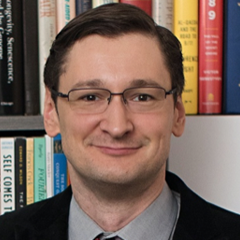 Andrei Irimia, PhD is Assistant Professor of Gerontology, Biomedical Engineering & Neuroscience at the University of Southern California. He is a biogerontologist, quantitative neurobiologist and data scientist using multimodal brain imaging to study traumatic brain injury, plasticity and repair. His laboratory investigates how neural connectivity alterations due to TBI contribute to neural degradation and cognitive impairment. Such knowledge is used to early identify individuals who are at high risk for mild cognitive impairment (MCI) and Alzheimer's disease (AD), to stratify them based on neurological risk factors and to single them out for patient-tailored clinical care. Areas of specific interests include (1) aging and neurodegeneration of the human connectome in traumatic brain injury (TBI), (2) the mechanisms linking TBI to MCI and AD, (3) the effects of vascular disease on brain aging. The Irimia Laboratory leverages large-scale parallel computation and cloud computing to implement novel approaches to patient profiling, biomedical knowledge discovery to the data science and visualization of complex, high-dimensional neuroimaging data. Click here for Dr. Irimia’s website.
Andrei Irimia, PhD is Assistant Professor of Gerontology, Biomedical Engineering & Neuroscience at the University of Southern California. He is a biogerontologist, quantitative neurobiologist and data scientist using multimodal brain imaging to study traumatic brain injury, plasticity and repair. His laboratory investigates how neural connectivity alterations due to TBI contribute to neural degradation and cognitive impairment. Such knowledge is used to early identify individuals who are at high risk for mild cognitive impairment (MCI) and Alzheimer's disease (AD), to stratify them based on neurological risk factors and to single them out for patient-tailored clinical care. Areas of specific interests include (1) aging and neurodegeneration of the human connectome in traumatic brain injury (TBI), (2) the mechanisms linking TBI to MCI and AD, (3) the effects of vascular disease on brain aging. The Irimia Laboratory leverages large-scale parallel computation and cloud computing to implement novel approaches to patient profiling, biomedical knowledge discovery to the data science and visualization of complex, high-dimensional neuroimaging data. Click here for Dr. Irimia’s website.
Alexander Lin, PhD.
 Alexander P. Lin, PhD is the director of the Center for Clinical Spectroscopy in the department of radiology at Brigham and Women’s Hospital and Assistant Professor of Radiology at Harvard Medical School. Dr. Lin is a graduate of the California Institute of Technology, where he completed his Masters degree in Bioengineering and his doctoral degree in Biochemistry and Molecular Biophysics. Dr. Lin commenced at Brigham and Women’s Hospital in 2009 where his research has focused on translating magnetic resonance spectroscopy technology into clinical practice in areas such as traumatic brain injury. As a member of the PINK Concussions Partner-Inflicted Task Force and the BWH Trauma Informed Care research team, he has more recently become involved in studies of intimate partner violence using MRS funded by the BWH Women’s Brain Initiative and the National Institutes of Health. Click here for Dr. Lin’s website.
Alexander P. Lin, PhD is the director of the Center for Clinical Spectroscopy in the department of radiology at Brigham and Women’s Hospital and Assistant Professor of Radiology at Harvard Medical School. Dr. Lin is a graduate of the California Institute of Technology, where he completed his Masters degree in Bioengineering and his doctoral degree in Biochemistry and Molecular Biophysics. Dr. Lin commenced at Brigham and Women’s Hospital in 2009 where his research has focused on translating magnetic resonance spectroscopy technology into clinical practice in areas such as traumatic brain injury. As a member of the PINK Concussions Partner-Inflicted Task Force and the BWH Trauma Informed Care research team, he has more recently become involved in studies of intimate partner violence using MRS funded by the BWH Women’s Brain Initiative and the National Institutes of Health. Click here for Dr. Lin’s website.
Hannah Lindsey, PhD.
 Hannah Lindsey, PhD earned a Bachelor’s degree in psychology with a minor in biology from the University of North Carolina Wilmington in 2012, a Master’s degree in psychology from New York University in 2015, and a Doctorate in experimental psychology with emphasis in cognitive and behavioral neuroscience from Brigham Young University in 2020. She is currently a post-doctoral research associate in the Traumatic Brain Injury and Concussion Center (TBICC) laboratory within the department of neurology at the University of Utah. Hannah’s primary research interests involve the use of advanced structural neuroimaging techniques and neuropsychological assessment to measure the neuroplastic potential of the brain during recovery from traumatic brain injury. She is also interested in the roles that brain and cognitive reserve, as well as plasticity-based neurorehabilitation may play in the recovery process. Hannah’s research further extends into the realm of statistical and experimental methodology, where she is interested in promoting the use of sound methodological practices and statistical rigor in scientific research in support of emerging efforts to establish replicability and transparency in the literature.
Hannah Lindsey, PhD earned a Bachelor’s degree in psychology with a minor in biology from the University of North Carolina Wilmington in 2012, a Master’s degree in psychology from New York University in 2015, and a Doctorate in experimental psychology with emphasis in cognitive and behavioral neuroscience from Brigham Young University in 2020. She is currently a post-doctoral research associate in the Traumatic Brain Injury and Concussion Center (TBICC) laboratory within the department of neurology at the University of Utah. Hannah’s primary research interests involve the use of advanced structural neuroimaging techniques and neuropsychological assessment to measure the neuroplastic potential of the brain during recovery from traumatic brain injury. She is also interested in the roles that brain and cognitive reserve, as well as plasticity-based neurorehabilitation may play in the recovery process. Hannah’s research further extends into the realm of statistical and experimental methodology, where she is interested in promoting the use of sound methodological practices and statistical rigor in scientific research in support of emerging efforts to establish replicability and transparency in the literature.
Amy Marshall, PhD.
 Amy D. Marshall, PhD, is a Professor of Psychology at The Pennsylvania State. Dr. Marshall received her Ph.D. in Clinical Psychology from Indiana University and completed a postdoctoral clinical research fellowship at the National Center for PTSD, Behavioral Sciences Division. Her research focuses on the impact of trauma and posttraumatic stress disorder (PTSD) on the use of family violence, including intimate partner violence, child abuse, and sibling violence. This includes examination of cognitive and neuroendocrine factors that contribute to sex differences in PTSD and the context-dependent nature of violence perpetration. She additionally focuses on factors that decrease the reliability of reports of intimate partner violence as well as methods for assessing family violence that include measurement of the context in which violence occurs. She uses this research to directly inform the development of family violence preventive interventions for parents of young children. Click here for Dr. Marshall’s website.
Amy D. Marshall, PhD, is a Professor of Psychology at The Pennsylvania State. Dr. Marshall received her Ph.D. in Clinical Psychology from Indiana University and completed a postdoctoral clinical research fellowship at the National Center for PTSD, Behavioral Sciences Division. Her research focuses on the impact of trauma and posttraumatic stress disorder (PTSD) on the use of family violence, including intimate partner violence, child abuse, and sibling violence. This includes examination of cognitive and neuroendocrine factors that contribute to sex differences in PTSD and the context-dependent nature of violence perpetration. She additionally focuses on factors that decrease the reliability of reports of intimate partner violence as well as methods for assessing family violence that include measurement of the context in which violence occurs. She uses this research to directly inform the development of family violence preventive interventions for parents of young children. Click here for Dr. Marshall’s website.
Karen Mason.
 Karen Mason is co-founder and director of community practice for SOAR (Supporting Survivors of Abuse and Brain Injury through Research), executive director of Third Space Charity, and former executive director of Kelowna Women’ Shelter in Kelowna, B.C. Canada. SOAR is a multi-disciplinary research collaboration that explores the incidence and effects of brain injury from intimate partner violence, and works to develop and disseminate education and training for those who work with survivors, along with support and interventions for survivors themselves. A seasoned and passionate non-profit leader, communicator, and community collaborator, Karen brings 30+ years of career experience to her work advocating for survivors of intimate partner violence (IPV) and other marginalized individuals.
Karen Mason is co-founder and director of community practice for SOAR (Supporting Survivors of Abuse and Brain Injury through Research), executive director of Third Space Charity, and former executive director of Kelowna Women’ Shelter in Kelowna, B.C. Canada. SOAR is a multi-disciplinary research collaboration that explores the incidence and effects of brain injury from intimate partner violence, and works to develop and disseminate education and training for those who work with survivors, along with support and interventions for survivors themselves. A seasoned and passionate non-profit leader, communicator, and community collaborator, Karen brings 30+ years of career experience to her work advocating for survivors of intimate partner violence (IPV) and other marginalized individuals.
Tricia Merkley, PhD.
 Tricia L. Merkley, PhD ABPP is a board-certified clinical neuropsychologist. She is an Assistant Professor in the Psychology Department and Neuroscience Center at Brigham Young University and an Adjunct Assistant Professor in the TBI and Concussion Center, Department of Neurology at the University of Utah School of Medicine. Her research primarily utilizes neuroimaging analysis to investigate structural brain changes following acquired brain injury and how they relate to neurobehavioral functioning during recovery. Click here for Dr. Merkley’s website.
Tricia L. Merkley, PhD ABPP is a board-certified clinical neuropsychologist. She is an Assistant Professor in the Psychology Department and Neuroscience Center at Brigham Young University and an Adjunct Assistant Professor in the TBI and Concussion Center, Department of Neurology at the University of Utah School of Medicine. Her research primarily utilizes neuroimaging analysis to investigate structural brain changes following acquired brain injury and how they relate to neurobehavioral functioning during recovery. Click here for Dr. Merkley’s website.
Kathleen Monahan, PhD.
 Kathleen Monahan, PhD, is Associate Professor at the School of Social Welfare, Stony Brook University. Dr. Monahan received her master’s in social work from Columbia University and her Doctorate from Adelphi University. She completed a NIMH funded post-doctoral fellowship in family violence at Stony Brook University, Psychology Department. Her research focuses on the health of adult survivors of childhood sexual abuse, the impact of trauma, and traumatic brain injury and Intimate Partner Violence.
Kathleen Monahan, PhD, is Associate Professor at the School of Social Welfare, Stony Brook University. Dr. Monahan received her master’s in social work from Columbia University and her Doctorate from Adelphi University. She completed a NIMH funded post-doctoral fellowship in family violence at Stony Brook University, Psychology Department. Her research focuses on the health of adult survivors of childhood sexual abuse, the impact of trauma, and traumatic brain injury and Intimate Partner Violence.
Philine Rojczyk, MSc.
 Philine Rojczyk is a PhD student at Child Brain Research and Imaging in Neuroscience (cBRAIN), Ludwig-Maximilians-University of Munich, where she focuses on diffusion tensor imaging of white matter microstructural integrity in patients with mild traumatic brain injury and post-traumatic stress disorder. She was trained in psychology (B.Sc. Leiden University, The Netherlands; M.Sc. Medical School Hamburg, Germany) and specialized in clinical psychology, neuropsychology and cognitive neuroscience. During the first year of her PhD, she spent a traineeship at the Psychiatry Neuroimaging Laboratory (PNL), Harvard Medical School where she acquired knowledge on advanced neuroimaging data processing techniques when working on a project of military war veterans with mild traumatic brain injury and post-traumatic stress disorder. As part of the ENIGMA IPV group, Philine aims at exploring alterations in white matter microstructural diffusivity of intimate partner violence affected women who sustained a mild traumatic brain injury and developed post-traumatic stress disorder.
Philine Rojczyk is a PhD student at Child Brain Research and Imaging in Neuroscience (cBRAIN), Ludwig-Maximilians-University of Munich, where she focuses on diffusion tensor imaging of white matter microstructural integrity in patients with mild traumatic brain injury and post-traumatic stress disorder. She was trained in psychology (B.Sc. Leiden University, The Netherlands; M.Sc. Medical School Hamburg, Germany) and specialized in clinical psychology, neuropsychology and cognitive neuroscience. During the first year of her PhD, she spent a traineeship at the Psychiatry Neuroimaging Laboratory (PNL), Harvard Medical School where she acquired knowledge on advanced neuroimaging data processing techniques when working on a project of military war veterans with mild traumatic brain injury and post-traumatic stress disorder. As part of the ENIGMA IPV group, Philine aims at exploring alterations in white matter microstructural diffusivity of intimate partner violence affected women who sustained a mild traumatic brain injury and developed post-traumatic stress disorder.
Cheryl Wellington, PhD.
 Cheryl Wellington, PhD is Professor and Vice Chair Research for the Department of Pathology and Laboratory Medicine, Full Member of Djavad Mowafaghian Center for Brain Health at the University of British Columbia, Principal Investigator at the International Collaboration on Repair Discoveries at Vancouver General Hospital and Associate Member of the UBC School of Biomedical Engineering. Dr. Wellington’s multidisciplinary research interests focus on Alzheimer’s Disease (AD), Traumatic Brain Injury (TBI) and neurology blood biomarkers. Her work on AD uses animal models and tissue engineered in vitro platforms to understand how lipoproteins including apolipoprotein E affect AD pathogenesis. Along with Dr. Peter Cripton, a Mechanical Engineer, Dr. Wellington founded the CHIMERA (Closed Head Model of Engineered Rotational Acceleration) animal model of TBI that is a leading model of concussion. Dr. Wellington is also leading major efforts to understand the neurological con sequences of COVID-19. Dr. Wellington holds multiple leadership and executive positions in the dementia and neurotrauma communities, including the Canadian Traumatic Brain Injury Research Consortium, the Canadian Concussion Network, the International Traumatic Brain Injury Research Consortium, the Canadian Consortium for Neurodegeneration in Aging, and the Cure Alzheimer Fund Research Leaders Group.
Cheryl Wellington, PhD is Professor and Vice Chair Research for the Department of Pathology and Laboratory Medicine, Full Member of Djavad Mowafaghian Center for Brain Health at the University of British Columbia, Principal Investigator at the International Collaboration on Repair Discoveries at Vancouver General Hospital and Associate Member of the UBC School of Biomedical Engineering. Dr. Wellington’s multidisciplinary research interests focus on Alzheimer’s Disease (AD), Traumatic Brain Injury (TBI) and neurology blood biomarkers. Her work on AD uses animal models and tissue engineered in vitro platforms to understand how lipoproteins including apolipoprotein E affect AD pathogenesis. Along with Dr. Peter Cripton, a Mechanical Engineer, Dr. Wellington founded the CHIMERA (Closed Head Model of Engineered Rotational Acceleration) animal model of TBI that is a leading model of concussion. Dr. Wellington is also leading major efforts to understand the neurological con sequences of COVID-19. Dr. Wellington holds multiple leadership and executive positions in the dementia and neurotrauma communities, including the Canadian Traumatic Brain Injury Research Consortium, the Canadian Concussion Network, the International Traumatic Brain Injury Research Consortium, the Canadian Consortium for Neurodegeneration in Aging, and the Cure Alzheimer Fund Research Leaders Group.
Leah Whitlow, MS.
 Leah Whitlow, MS is a second-year Ph.D. student in Dr. Michael Larson’s laboratory at Brigham Young University. Mrs. Whitlow has a B.A. in English-Literary Analysis from Vanderbilt University and a M.S. in Psychology from Auburn University in Montgomery. Her research will use neuroimaging techniques to understand the effects of traumatic brain injury on autonomic nervous system dysfunction across the lifespan. She is particularly interested in how traumatic brain injury affects heart rate variability. She hopes that her research will contribute to our collective understanding of the impact of traumatic brain injury on the autonomic nervous system to be used for rehabilitative interventions.
Leah Whitlow, MS is a second-year Ph.D. student in Dr. Michael Larson’s laboratory at Brigham Young University. Mrs. Whitlow has a B.A. in English-Literary Analysis from Vanderbilt University and a M.S. in Psychology from Auburn University in Montgomery. Her research will use neuroimaging techniques to understand the effects of traumatic brain injury on autonomic nervous system dysfunction across the lifespan. She is particularly interested in how traumatic brain injury affects heart rate variability. She hopes that her research will contribute to our collective understanding of the impact of traumatic brain injury on the autonomic nervous system to be used for rehabilitative interventions.
Paul van Donkelaar, PhD.
 Paul van Donkelaar, PhD is co-founder and principal investigator for SOAR. He is also a professor in the School of Health and Exercise Sciences and Associate Vice Principal, Research at the University of British Columbia’s Okanagan campus in Kelowna, B.C., Canada. His program of research focusses on the basic mechanisms of sensorimotor control and the cerebrovascular, neurocognitive, and sensorimotor aspects of brain dysfunction resulting from traumatic brain injury (TBI). Since 2016, he has started to focus his research on better understanding brain dysfunction in women who have experienced intimate partner violence-related TBI in collaboration with Kelowna Women’s Shelter through the SOAR project. Click here for Dr. van Donkelaar’s website. Also, see the following link for access to the SOAR project.
Paul van Donkelaar, PhD is co-founder and principal investigator for SOAR. He is also a professor in the School of Health and Exercise Sciences and Associate Vice Principal, Research at the University of British Columbia’s Okanagan campus in Kelowna, B.C., Canada. His program of research focusses on the basic mechanisms of sensorimotor control and the cerebrovascular, neurocognitive, and sensorimotor aspects of brain dysfunction resulting from traumatic brain injury (TBI). Since 2016, he has started to focus his research on better understanding brain dysfunction in women who have experienced intimate partner violence-related TBI in collaboration with Kelowna Women’s Shelter through the SOAR project. Click here for Dr. van Donkelaar’s website. Also, see the following link for access to the SOAR project.
Glynnis Zieman, MD.
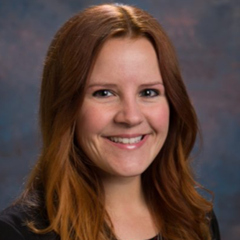 Glynnis Zieman, MD is a traumatic brain injury and sports neurologist at Barrow Neurological Institute at St. Joseph’s Hospital and Medical Center. She is board certified in Adult Neurology by the American Board of Psychiatry and Neurology, as well as in Headache Medicine by the United Council for Neurologic Subspecialties. Dr. Zieman’s research interests include traumatic brain injury in domestic violence victims and posttraumatic headache. Dr. Zieman received her medical degree from the University of Missouri- Kansas City School of Medicine. She completed her adult neurology residency, as well as Neuro Oncology and Traumatic Brain Injury/Sports Neurology fellowships at Barrow Neurological Institute. She is currently a faculty physician in the department of neurology at Barrow Brain Injury and Concussion Center and also serves as the Associate Program Director for the Adult Neurology residency program at Barrow Neurological Institute. As a sports neurologist, Dr. Zieman provides sideline neurological assessment coverage for Arizona State University soccer, football, hockey and lacrosse teams and is an Unaffiliated Neurotrauma Consultant for the National Football League. She is the Medical Director of the Domestic Violence Traumatic Brain Injury Treatment Program at Barrow, as well as the Traumatic Brain Injury Clinic at San Carlos Apache Healthcare Center. In her free time, Dr. Zieman enjoys running marathons and hiking with her family. Click here for Dr. Zieman’s website.
Glynnis Zieman, MD is a traumatic brain injury and sports neurologist at Barrow Neurological Institute at St. Joseph’s Hospital and Medical Center. She is board certified in Adult Neurology by the American Board of Psychiatry and Neurology, as well as in Headache Medicine by the United Council for Neurologic Subspecialties. Dr. Zieman’s research interests include traumatic brain injury in domestic violence victims and posttraumatic headache. Dr. Zieman received her medical degree from the University of Missouri- Kansas City School of Medicine. She completed her adult neurology residency, as well as Neuro Oncology and Traumatic Brain Injury/Sports Neurology fellowships at Barrow Neurological Institute. She is currently a faculty physician in the department of neurology at Barrow Brain Injury and Concussion Center and also serves as the Associate Program Director for the Adult Neurology residency program at Barrow Neurological Institute. As a sports neurologist, Dr. Zieman provides sideline neurological assessment coverage for Arizona State University soccer, football, hockey and lacrosse teams and is an Unaffiliated Neurotrauma Consultant for the National Football League. She is the Medical Director of the Domestic Violence Traumatic Brain Injury Treatment Program at Barrow, as well as the Traumatic Brain Injury Clinic at San Carlos Apache Healthcare Center. In her free time, Dr. Zieman enjoys running marathons and hiking with her family. Click here for Dr. Zieman’s website.
Edie Zusman, MD.
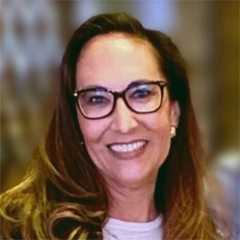 After her UCSF Molecular Medicine Research Fellowship, Dr. Zusman directed the UC Davis Bronte Epilepsy Research Laboratory and was a Principal Investigator for the NSF funded Biophotonics Science and Technology Center. After completing her MBA, she was recruited to NorthBay as Chief of Neurosurgery and Medical Director of the Mayo Clinic Network Affiliated Center for Neuroscience where she led the Traumatic Brain Injury and Concussion Program first analyzing that concussion DV/IPV was the same on all metrics as concussion from other causes. She is currently Adjunct Professor of Neurosurgery, Touro University School of Medicine, and Director of TBI and Concussion Research at the Piedmont Neuroscience Center. Her research is focused on unrecognized and undiagnosed concussion in domestic, intimate partner, family violence/child abuse and the significant public health impacts.
After her UCSF Molecular Medicine Research Fellowship, Dr. Zusman directed the UC Davis Bronte Epilepsy Research Laboratory and was a Principal Investigator for the NSF funded Biophotonics Science and Technology Center. After completing her MBA, she was recruited to NorthBay as Chief of Neurosurgery and Medical Director of the Mayo Clinic Network Affiliated Center for Neuroscience where she led the Traumatic Brain Injury and Concussion Program first analyzing that concussion DV/IPV was the same on all metrics as concussion from other causes. She is currently Adjunct Professor of Neurosurgery, Touro University School of Medicine, and Director of TBI and Concussion Research at the Piedmont Neuroscience Center. Her research is focused on unrecognized and undiagnosed concussion in domestic, intimate partner, family violence/child abuse and the significant public health impacts.

